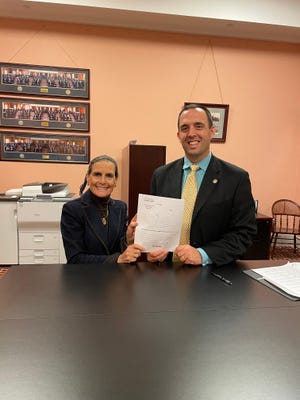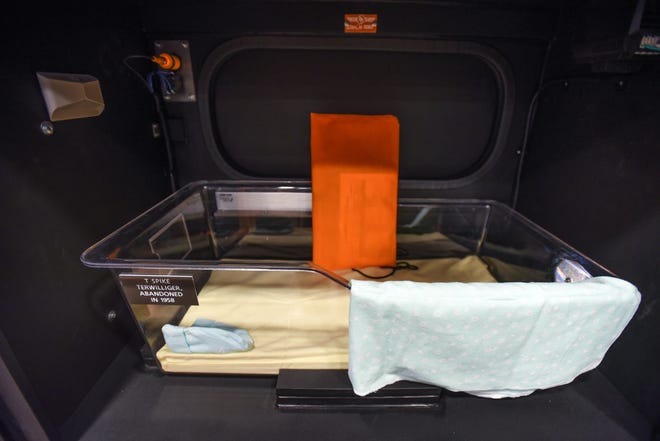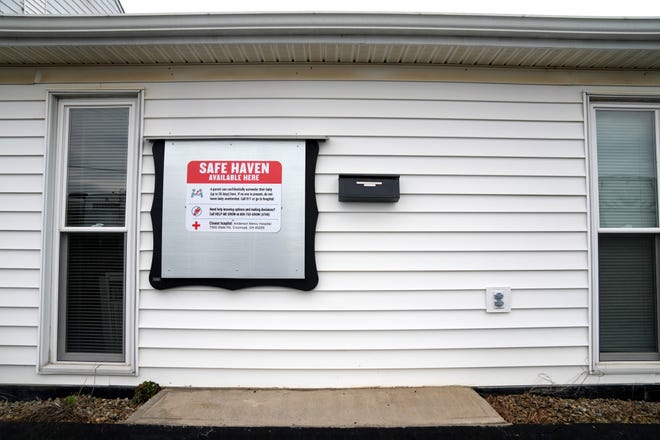Cincinnati EnquirerHear this story
1:48
2:07

Two state representatives hope to make it easier for Ohio fire stations to have boxes where parents can anonymously drop off newborn babies, even when those locations are not staffed at all times.
Republican Reps. Jean Schmidt, of Loveland, and Adam Mathews, of Lebanon, introduced a bill revising some of the laws for newborn safety incubators, more commonly known as baby boxes.
“Every child has right to life,” Schmidt said in a press release about the bill. “This bill ensures these babies have their rights to life.”
The bill would remove the requirement that a person staff the box at all times and rely on the box’s automatic call to 911.
Monica Kelsey, who founded the Indiana-based nonprofit Safe Haven Baby Boxes in 2015, has pushed for Ohio officials to allow electronic monitoring rather than 24-hour staffing on the organization’s website and on social media.
“Many of our communities in the state have stepped up to help mothers in tough situations. We trust our police and fire to help protect the most vulnerable,” Mathews said in a press release.
What are baby boxes?
Baby boxes are climate-controlled incubators attached to fire or police stations.
To surrender a baby, a parent opens the exterior door and places the baby inside the bassinet. The door locks automatically when closed, meaning the parent cannot open it again.
When the door is opened, it triggers a silent alarm that alerts the people at the station. Another silent alarm goes off when the baby activates the motion sensor inside the box. The alarm then calls 911.
Staff use the interior door to retrieve the baby, check for signs of abuse or neglect, and give the baby any medical attention needed.

Parents are already legally able to anonymously surrender a child younger than 30 days at a hospital, fire department or police department where there are medically trained professionals, under Ohio’s Safe Haven law, which was passed in 2001.
Where are Greater Cincinnati’s baby boxes?
Greater Cincinnati has two open baby boxes, one at the Delhi Township Fire Department, which is staffed 24 hours a day, and one at the Fort Mitchell Fire Department.
Union Township in Clermont County closed its baby box because of the 24-hour staffing requirement, Fire Chief Stan Deimling said.
Lebanon has installed a baby box but it has not been activated yet, City Manager Scott Brunka told The Enquirer in February. Brunka did not respond to a question about whether the activation was delayed because of a staffing requirement.
Learn more:‘The last option a parent has left.’ Why a baby box could be coming to your town
What would the bill do?
The current law allows baby boxes at hospitals, police stations and emergency medical service organizations. Babies can also be surrendered in person to people who work for any of those agencies.
Ohio Administrative Code, a set of rules for state agencies, requires baby box locations to have at least one person on duty at all times.
The bill introduced by Mathews and Schmidt would remove that requirement and consider a baby box supervised if no one is present at the location but an emergency responder is dispatched by the second alarm that calls 911.
The bill states this would apply when no one at the baby box location responds to the first alarm within a reasonable amount of time. It would also apply when all people at a baby box location have been dispatched on an emergency call.
The bill would also make it clear that employees at a baby box location are not liable for damages if they do not respond within a reasonable amount of time unless the reason they failed to respond is willful or wanton misconduct.

Why is the staffing requirement in place?
Ken Gordon, press secretary with the Ohio Department of Health, told The Enquirer in February that there has to be a person on-site to immediately answer the alarm and assess the baby’s condition.
“Technology and alarms may fail, and if they fail at this most critical time, the on-site individual’s role is of the highest importance,” he said.
Kelsey told The Enquirer she believes electronic monitoring should satisfy the requirement.
Who are the legislators?
Anti-abortion activists often present Safe Haven laws and baby boxes as alternatives to abortions, despite research that shows women who are denied abortions tend to raise children themselves rather than choose adoption.
U.S. Supreme Court Justice Amy Coney Barrett asked about Safe Haven laws specifically during oral arguments in Dobbs vs. Jackson Women’s Health Organization, in which the conservative justices found no constitutional basis for a right to an abortion.
Mathews cosponsored legislation to ban abortion within the city of Lebanon during his time as vice mayor. He previously served as chair of the board of directors for Elizabeth’s New Life Center, which operates “women’s centers” that aim to dissuade people from getting an abortion.
At a hearing on an abortion bill last year, Schmidt referred to a hypothetical about a teenager becoming pregnant from rape as an “opportunity.” She has previously served as president of Cincinnati Right to Life.
What happens next?
The bill was referred to the public health policy committee March 22. To check its status, visit ohiohouse.gov/legislation.
Erin Glynn is the watchdog reporter for Butler, Warren and Clermont counties through the Report For America program. The Enquirer needs local donors to help fund her grant-funded position. If you want to support Glynn’s work, you can donate to her Report For America position at this website or email her editor Carl Weiser at cweiser@enquirer.com to find out how you can help fund her work.
Do you know something she should know? Send her a note at eglynn@enquirer.com and follow her on Twitter at @ee_glynn
